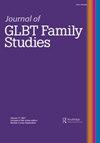Pathways to Successful Queer Stepfamily Formation
IF 2
Q2 FAMILY STUDIES
引用次数: 0
Abstract
Abstract Queer stepfamilies occupy multiple marginalized statuses (e.g., queer, step). Accordingly, it is logical to expect these stepfamilies might be particularly vulnerable to adjustment difficulties, and scant literature demonstrates some of these. Other literature suggests some queer stepfamilies might be particularly flexible, adept, and less rooted in heteronormative ideals (e.g., expecting queer repartnerships to function like first partnerships) when adjusting to stepfamily life. However, the processes these families use to navigate stepfamily formation and adjustment are relatively unexplored. The current phenomenological study identified the strategies queer stepfamilies used to navigate early stepfamily life and how combinations of strategies represented larger pathways of family formation. Data came from family, couple, and individual focal child interviews about the lived experiences of six queer stepfamilies. Participants reported strategies consistent with Oswald’s [(2002). Resilience within the family networks of lesbians and gay men: Intentionality and redefinition. Journal of Marriage and FamilyFamily, 64(2), 374. 383, doi:10.1111/j.1741-3737.2002.00374.x] redefinition and intentionality framework. Variations in how these strategies were used led to the identification of three pathways. In contrast to a traditional monolithic view of queer families, our findings identify important within-group variations. The strategies and pathways suggest important implications for how practitioners might conduct assessments and carry out a strengths-based course of treatment or psychoeducation.成功组建Queer继家庭的途径
摘要酷儿继家庭占据着多重边缘地位(如酷儿、继子女)。因此,预计这些继家庭可能特别容易受到适应困难的影响是合乎逻辑的,而且很少有文献证明其中的一些。其他文献表明,一些酷儿继家庭在适应继家庭生活时可能特别灵活、娴熟,而且不太植根于非规范理想(例如,期望酷儿重新结婚能像第一次伴侣关系一样发挥作用)。然而,这些家庭用来引导继家庭形成和调整的过程相对未被探索。目前的现象学研究确定了酷儿继家庭在早期继家庭生活中使用的策略,以及策略的组合如何代表更大的家庭形成途径。数据来自对六个同性恋继家庭的生活经历的家庭、夫妇和个人焦点儿童采访。参与者报告了与奥斯瓦尔德的策略一致的策略[(2002)。女同性恋和男同性恋家庭网络中的弹性:意向性和重新定义。婚姻与家庭杂志,64(2),374。383doi:10.1111/j.1741-337.2002.00374.x]重新定义和意向性框架。这些策略使用方式的变化导致了三种途径的确定。与传统的单一的酷儿家庭观点相反,我们的发现发现了重要的群体内部变异。这些策略和途径对从业者如何进行评估和开展基于优势的治疗或心理教育课程提出了重要启示。
本文章由计算机程序翻译,如有差异,请以英文原文为准。
求助全文
约1分钟内获得全文
求助全文
来源期刊

JOURNAL OF GLBT FAMILY STUDIES
FAMILY STUDIES-
CiteScore
3.90
自引率
0.00%
发文量
0
期刊介绍:
The Journal of GLBT Family Studies is a much-needed resource on the working dynamics of the diverse family structures found in every corner of the world. This groundbreaking new journal addresses the vital issues facing gay, lesbian, bisexual, and transgender individuals and their families. Edited by Dr. Jerry J. Bigner, who has provided expert witness testimony in legal cases and in the litigation involving same-sex marriages in Canada, the journal features interdisciplinary studies and scholarly essays on topics related to GLBT family life and functioning as well as relationships with other families.
 求助内容:
求助内容: 应助结果提醒方式:
应助结果提醒方式:


